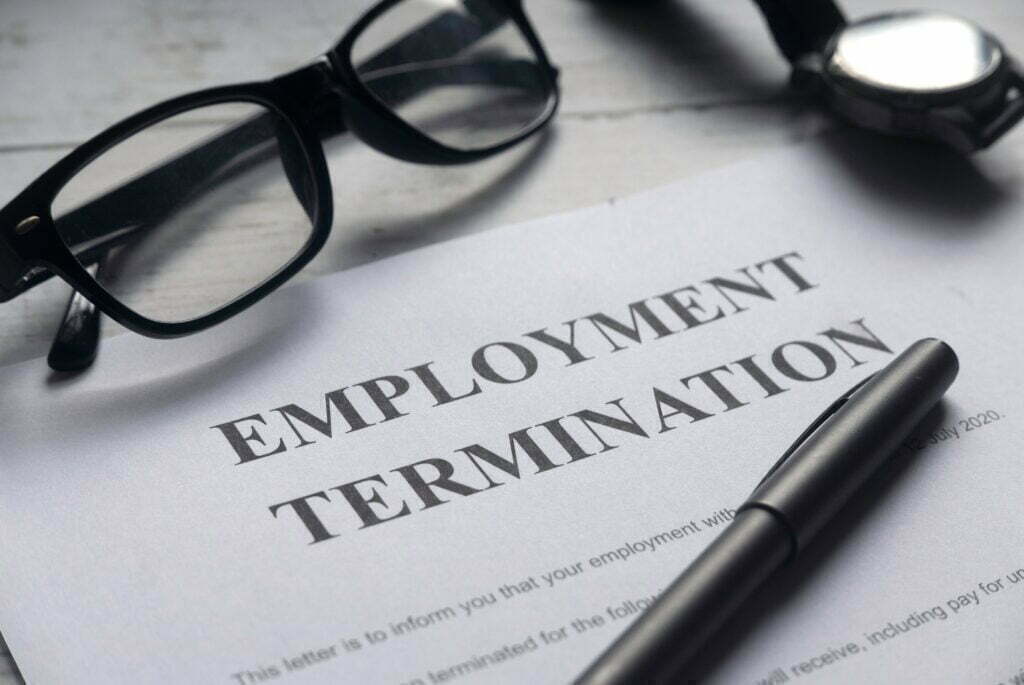Suffering a work-related injury can be a traumatic experience. You may be left with physical and emotional scars, not to mention the burden of mounting medical bills. On top of that, you may also be worried about losing your job. But is it legal for your employer to terminate you following a workers’ comp claim?

The good news is that typically, employers will not terminate an injured worker after he or she has been hurt on the job. That would be considered retaliation and is against the law. However, there are certain circumstances where an employer may be able to terminate an employee following a workers’ comp claim.

It is important to know that based on North Carolina employment laws, filing a claim does not ultimately protect you from being fired—so it is true that there is still a possibility you could lose your job.
One common scenario is if the employee’s injury prevents them from performing their job duties. If the employer can show that there are no suitable alternative positions available and that the employee is unable to perform their previous job duties, they may be able to terminate the employee.
Another situation in which a termination may be legal is if the employee violates company policy or engages in misconduct. In this case, the termination would be unrelated to the workers’ compensation claim and would be based on the employee’s actions.
It’s important to note that employers must have a legitimate reason for terminating an employee following a workers’ compensation claim. If the termination is found to be retaliatory or discriminatory, the employer could face legal consequences.
If you believe that your employer has terminated you unlawfully following a workers’ comp claim, there are steps that you can take to fight back. First and foremost, it’s important to gather any evidence that supports your claim. This may include documentation of your injury, medical records, correspondence with your employer, and witness statements.
Next, you should consider contacting an attorney who specializes in employment law. They can advise you on your rights and options, as well as help you navigate the legal process. They may also be able to negotiate a settlement with your employer on your behalf.
If you choose to pursue legal action, you may need to file a complaint with the appropriate government agency, such as the Equal Employment Opportunity Commission (EEOC) or the Department of Labor. They will investigate your claim and determine whether there is evidence of unlawful termination.
In some cases, it may be possible to resolve the issue through mediation or arbitration. This can be a more cost-effective and efficient way to resolve disputes, and may result in a settlement that is satisfactory to both parties.
Ultimately, the best way to fight against unlawful termination is to be informed, prepared, and persistent. With the right evidence and legal support, you can protect your rights and hold your employer accountable for any wrongdoing.

While it’s not required to seek the assistance of an attorney when you are terminated following a workers’ compensation claim, it’s highly recommended. An experienced attorney can help you navigate the complex legal system and ensure that your rights are protected. They can also help you understand the laws surrounding workers’ compensation and wrongful termination.
Make sure you have someone looking out for you and your rights—someone who thoroughly understands North Carolina workers’ compensation laws and how to make wrongs right if you’ve been injured on the job. Don’t feel intimidated into not filing the workman’s comp claim that you rightly deserve. With a team like Oxner + Permar, you’ll have years of experience and successful litigation on your side.
Have you ever heard horror stories about workers’ compensation? Maybe you’ve heard that it’s impossible to get approved, or that it’s a long and complicated process. Whatever the case may be, it’s important to remember that you just do not trust everything you hear about workers’ comp.

If you’ve lost your job after a work injury, it might feel like you’re completely out of options—especially if your employer has told you that you’re no longer eligible for workers’ compensation. Often, an employer will tell an employee that they are no longer entitled to workers’ compensation, hoping that the employee will forget about the claim. This simply is not true: you are entitled to workers’ compensation even if you have been terminated from your job. So don’t give up!
Another thing to watch out for is that some insurance companies will try to tell you your claim will close once treatment has ended. Also not true. The only way a claim can close or settle is by your voluntary agreement via a compromise with the insurance company.

At Oxner + Permar, we understand that these problems can be difficult to navigate without professional help. If you’re unsure of anything regarding your case, be sure to contact an attorney. With more than $275 million in workers’ compensation awards and settlements, we’ve got the experience to help our clients navigate their way through misinformation and make sure that their rights are being protected.
Getting injured on the job can be a life-changing experience. Not only do you have to deal with the physical pain and recovery, but you may also have to navigate the complicated world of workers’ comp and disability payments. One common question that arises is “Can I get both Workers’ Comp and Disability Payments?”

The answer is… it depends. Note that we are not talking about Social Security Disability. The answer to that is an easy “yes.” You can always draw Social Security Disability (or retirement) checks at the same time as you get workers’ compensation weekly checks. But what about the private disability policies like AFLAC or Unum?
Most of these policies have exclusions in them which specifically say they do not pay for a disability which was caused by a workers’ compensation injury. So in these instances the workers’ compensation laws do not prevent you from getting both checks — the North Carolina Industrial Commission doesn’t care — but the company which provides the disability insurance will care.
If you are uncertain if you can draw both benefits you should ask a workers’ compensation lawyer to look at your disability policy for you. With us, at least, it doesn’t matter if we represent you in your workers’ compensation claim. We’re happy to take a few minutes with you to go over your options.
There are a couple of situations which we want to highlight. The first applies to truck drivers, particularly over-the-road drivers. If you drive for a trucking company which is NOT based in North Carolina this applies to you. Many out-of-state companies require their drivers to carry an Occupational Accident Disability policy. These are an attempt at getting around workers’ compensation insurance. In most of these you cannot get both benefits and there may even be language that if you apply for workers’ compensation you cannot get the benefits of that policy. We’ve had a lot of success in getting around these restrictions against worker’s compensation. Call us and let us walk you through the process.

Another situation arises with some unions. For instance in the collective bargaining agreement in place with UPS drivers have disability insurance in addition to their workers’ compensation benefits. Even when the injured driver is drawing workers’ compensation checks they would be entitled to at least the $200.00 per month minimum payment. Other unions have similar provisions. Neither your employer nor your workers’ compensation adjuster will likely bring this to your attention.
What happens if the adjuster denies your workers’ compensation claim but you want to apply for disability insurance? Call us. This is tricky and cannot be answered easily because it is not a “one size fits all” answer. But do call us — we aggressively go after workers’ compensation adjusters for denying good claims. And the disability insurance can play a big role in this fight.
We often have clients who worry that their employer might not have workers’ compensation insurance. They aren’t sure what the requirements are for their employers. So, it’s not uncommon that we get the question, “Is my employer required to have workers’ comp insurance?”

Nine times out of ten, an employer is required to have workers’ comp insurance! Generally, any employer who regularly employs four or more workers (either full-time or part-time) is required to have workers’ comp insurance and is not allowed to opt out of this requirement.
There are a few exceptions, however, and they are:
Although these employers are not required to carry workers’ comp insurance, any employer may purchase coverage. Therefore, regardless of who your employer is, it is always worth asking them if they carry workers’ comp insurance. You may find that you are in fact covered.

If an employer is required by law to have workers’ compensation insurance but fails to comply, there can be serious consequences. The consequences can vary depending on the state, but some of the most common ones include:
Employers who fail to provide workers’ compensation insurance can face legal penalties. These penalties can range from fines to criminal charges.
When an employee is injured on the job and the employer does not have workers’ compensation insurance, the employee can sue the employer for damages. If the employee wins the lawsuit, the employer can be ordered to pay a significant amount of money.
In some states, employers who do not have workers’ compensation insurance can lose their business license. This can be devastating for a business, as it can result in the closure of the company.
If word gets out that an employer does not have workers’ compensation insurance, it can damage the company’s reputation. Potential employees may be hesitant to work for the company, and customers may be hesitant to do business with them.
In some cases, if an employer does not have workers’ compensation insurance, they can be held personally liable for any injuries that occur on the job. This means that the employer’s personal assets could be at risk in the event of a lawsuit.

If you are injured at work and your employer does not have workers’ compensation insurance, you may feel like you are out of options. However, there are steps you can take to protect yourself and ensure that you receive the compensation you deserve.
First, seek medical attention immediately. Your health and well-being should always be your top priority. Once you have received medical treatment, document everything. Keep records of your medical bills, doctor’s notes, and any other relevant documents. This will be important evidence if you decide to pursue legal action.
Next, consult with an experienced workers’ compensation attorney. They can help you navigate the legal system and determine your options for compensation. They may also be able to negotiate a settlement with your employer outside of court.
If your employer is not willing to provide compensation, you may need to file a lawsuit. Keep in mind that this can be a lengthy and expensive process, so it’s important to have a strong case and the support of a skilled attorney.
Remember, just because your employer does not have workers’ compensation insurance does not mean that you are not entitled to compensation for your injuries. Take action to protect your rights and hold your employer accountable.
If you have specific concerns as to whether or not your employer should be carrying workers’ compensation insurance, don’t hesitate to ask an attorney. An experienced attorney, such as those at Oxner + Permar will be able to tell you specifically whether or not if you should be covered.
Well… we all live with our choices of elected officials. The history of workers’ compensation laws show that the slant of the law has shifted dramatically over time. In the early days, workers’ compensation was a system designed “to provide swift and sure compensation to injured workers.”

This was true since the early 1900s. Over the last ten years we’ve seen a concerted effort by business lobbying groups and the insurance industry to make the workers’ compensation laws more employer-oriented. This resulted in new laws quickly put into place in 2011.
The new laws are discussed in detail in our book, Seven Devastating Changes. This new set of workers’ compensation laws undid decades of law and court decisions and stripped injured workers of much of their rights.
Three key changes: First, your employer and the workers’ compensation adjuster can talk or write to the doctor they chose to treat you without copying you on the letter or being in on the conversation.
Second, you can be required to perform “make-work” or basically get paid to sit around and do nothing at work. Workers’ compensation adjusters love this because it gets injured workers off of weekly checks funded by the insurance company. Employers dislike it because they have to pay you full wages to do nothing of value. Rarely do employers take out their frustration on the adjuster though – the injured worker is a more likely target.
Third, and the worst, is that the legal workers’ compensation definition of “suitable employment” was gutted of its single most important element: that the pay was comparable to what you used to make.
Consider a 35-year-old, skilled mechanic who might be making $45,000.00 per year. Under the old workers’ compensation law he could be asked to take a job paying $38,000.00 or so and the adjuster would have to pay two-thirds of his wage loss for 300 weeks from the date of the injury. Under the old workers’ compensation laws the injured worker had a cushion to help him get back up to speed.
That injured worker could not be required to take a part-time, minimum wage job because that would not be “suitable” to him. This was because when the 300 weeks were up he’d likely still be far from where he was before his employer injured him.

Mind you workers’ compensation defendants tried of course! We represented a flight attendant one time that earned about $50,000.00 per year. Her vocational rehabilitation professional (someone hired by the workers’ compensation adjuster to find her a job) from CorVel instructed her to apply for jobs at fast-food restaurants because she “had experience handing out food and beverages.”
She hired us and we put a stop to that nonsense. Under the new workers’ compensation laws, however, she would have no recourse. It doesn’t matter how well trained or well-paid you are or were.
Under the 2011 workers’ compensation law you could be required to accept a part-time, minimum-wage job or risk having your benefits terminated. The workers’ compensation adjusters must’ve been laughing all the way to the bank. What to do? As workers’ compensation attorneys we’ve had a lot of success turning this system on it’s head. Call us and let us explain how.